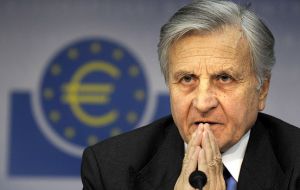MercoPress. South Atlantic News Agency
Euro zone resumes bond purchases amid fears of growing crisis contagion
 Jean Claude Trichet: economic uncertainty is “particularly high”'.
Jean Claude Trichet: economic uncertainty is “particularly high”'. European Central Bank (ECB) announced Thursday it will offer a fresh round of loans to banks (*) in light of continuing fears about the Euro-zone debt crisis. ECB president Jean Claude Trichet said that economic uncertainty was “particularly high”'.
“Given the renewed tensions in some financial markets, [the ECB] has decided to conduct a supplementary refinancing operation,” said the bank's president, Jean-Claude Trichet.
Earlier, the ECB kept Euro-zone interest rates on hold at 1.5%, as expected.
Trichet would not comment on whether the ECB was actively buying government bonds to help support countries with high borrowing costs, other than to say the process was ongoing and fully transparent.
The market would know as and when any bonds were purchased, he said. However, reports suggested the ECB had entered the market to buy government debt.
The bank raised rates to 1.5% from 1.25% last month to try to cool rising prices in the 17 Euro-zone countries. The ECB started increasing rates in April, when they were raised from 1% to 1.25%.
Figures released last week showed that inflation in the Euro zone slowed unexpectedly in July to 2.5%, down from 2.7% in June. However, Mr Trichet said the bank expected inflation to remain “clearly” above its target rate of just below 2% over the coming months, partly due to higher energy and commodity prices.
Acknowledging a slowdown in Euro zone economic growth in recent months, he added that “continued moderate expansion is expected in the period ahead”.
The decision to hold rates comes as concerns about the Euro-zone debt crisis are resurfacing, as attention returns to the bloc following an agreement in the US to raise the country's borrowing limit and cut spending.
On Thursday, the interest rate that Spain had to agree to pay to raise 2.2bn Euros for three years rose sharply to 4.8% from 4% at a similar bond auction in early June. This reflects heightened concerns about Spain's ability to repay its debts.
However, analysts said demand for the latest bond issue was strong and despite the rise in rates, suggested 4.8% was a sustainable rate of interest for Madrid to pay.
European Commission President Jose Manuel Barroso also warned that the sovereign debt crisis was spreading beyond the periphery of the Euro zone. In a letter to European governments, he called on them to give their “full backing” to the Euro currency zone.
On Wednesday, Italian Prime Minister Silvio Berlusconi gave a speech in parliament to try and reassure investors that the country would not be drawn into the debt crisis.
(*) The ECB justified the liquidity injection saying that “given the renewed tensions in some financial markets in the Euro area, the Governing Council of the European Central Bank has today decided to conduct a liquidity-providing supplementary longer-term refinancing operation (LTRO) with a maturity of approximately six months.
“The operation will be conducted as a fixed rate tender procedure with full allotment. The rate in this operation will be fixed at the average rate of the main refinancing operations (MROs) over the life of the supplementary LTRO. The operation will be announced on 9 August 2011, with allotment on 10 August 2011 and settlement on 11 August 2011, and will mature on 1 March 2012.
“The ECB also decided to continue conducting its MRO as fixed rate tender procedures with full allotment for as long as necessary, and at least until the end of the last maintenance period of 2011 on 17 January 2012. This procedure will also remain in use for the Euro-system’s special-term refinancing operations with a maturity of one maintenance period, which will continue to be conducted for as long as needed, and at least until the end of the last quarter of 2011. The fixed rate in these special-term refinancing operations will be the same as the MRO rate prevailing at the time.
“Furthermore, the Governing Council has decided to conduct the three-month LTRO to be allotted on 26 October, 30 November and 21 December 2011 as fixed rate tender procedures with full allotment. The rates in these three-month operations will be fixed at the average rate of the MRO over the life of the respective LTRO”.




Top Comments
Disclaimer & comment rules-

Read all commentsEuro zone resumes bond purchases = EC continues to eat it's own junk :D
Aug 05th, 2011 - 05:31 pm 0Commenting for this story is now closed.
If you have a Facebook account, become a fan and comment on our Facebook Page!